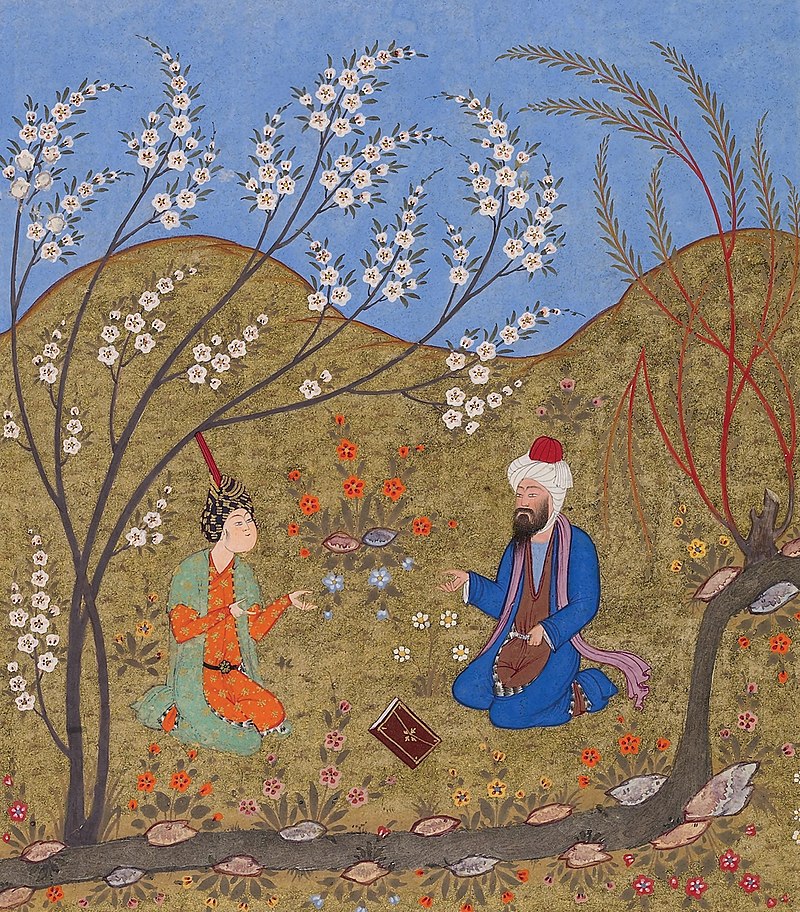Truth of Sufism
|
Truth of SufismThe general impression about Sufis in the Indian sub-continent revolves around spiritual, mystic or religious thoughts and practices. This is probably because their relevance and influence in politics of yesteryears is seldom mentioned, let alone highlighted, in modern historical narratives. Actually, Islam lacks philosophy and
spirituality. There was nothing but violence that is at the core of their
religion. So called Sufis found that Bhakti marg attracts Bhole-Bhale hindus
because of absence of rituals. They sniffing the opportunity developed a
strategy. Sufism is nothing but a hodge podge of appropriated concepts from
Vedanta, Buddhism & Kashmiri Shaivism (Tantra) & practises from Yoga
that were Islamized with familiar Persian & Arabic terms & conventions
to normalize the foreignness of these concepts. Those discerning have always
known Sufism as deceit and subterfuge to lull Hindus into inaction before
strong arm of Izlam was applied..it was invented for the purpose! Sita Ram Goel on SufismSita Ram Goel had warned in 1985 that this fatal love of Hindus for Sufis will be their ruin. It is Hindus who have kept the Sufi tradition alive in India by visiting and donating to Ajmer as well as most other dargahs. It is a tradition which has always wanted to convert them. The obsession of Hindus with Ajmer,
Chishtiya Silsila and Sufis in general is very unhealthy. Some professors
(from JNU & other universities) have built their career by whitewashing
the history of Sufis in India & continue to do so. He has also warned
about the absurdity of Hindu professors and academicians sitting in India’s
top universities and singing paeans about Ajmer and other Sufi orders in
India. They are doing a great disservice by confusing Hindus about the real
nature of Sufism. Sita Ram Goel says in ‘Muslim Separatism’: “Many Hindus have been misled, mostly by their own ‘soft-headed scholars’ to cherish the fond belief that the Sufis were spiritual seekers, and that unlike the Mullahs, they loved Hindu religious lore and liked their Hindu neighbors.” “The Chishtiyya Sufis in particular
have been chosen for such fulsome praise.” SRG says. We can see this
deplorable trend even now when professors from JNU keep whitewashing the
fanatic and barbaric record of the Sufi orders, particularly the Chishtiya
order. These Sufi orders were fanatic since the beginning. An Islamic scholar
Aziz Ahmad says: “In Indian sufism anti-Hindu polemics began with Muin al-din
Chishti. Early Sufis in the Punjab and early Chishtis devoted themselves to
the task of conversion on a large scale.” Nizamuddin Auliya is championed as a great spiritual figure. He actually thought that Hindus could not get Allah’s grace and could not be easily converted until they were in the company of some Muslim fakirs and saints for a long time and only then conversion would follow. This is very crucial. Sufism is a front to convert Hindus who are given to reverence for anything which sounds remotely spiritual. It is their strength, but also their weakness. The early attacks of Islam in India established that defeating and converting Hindus is not easy. Thus Islamic scholars came up with a plan. They started imitating and mimicking Hindu sadhus. Muslim fakirs and Sufis started imitating the guru parampara of Hindus and copied Vedantic philosophy, imitating it in songs and popular literature. But the core of Islamic
fundamentalism was never changed. Sufism was a cover for military Islam. This
can be traced to their ideology/practice. They existed to fool Hindus about a
spiritual core in Islam, to convert them. 'Sufis of Bijapur' tells this story.
Amir Khusrau & Ziauddin Barani were disciples of Auliya but were deeply
fanatic. “Both of them express a great hatred for Hindus, and regret that the
Hanafi school of Islamic Law had come in the way of wiping out completely the
curse of infidelism from the face
Hindustan.” Chishtiya order in Ajmer is not the
only Sufi order which was Islamic fundamentalist in nature. Ahmad Sirhindi
(1564-1624) was another Sufi who had great influence on India. He wrote many
letters to powerful courtiers in the reign of Akbar and Jehangir. In letter No. 163 he wrote: “The honour of Islam lies in insulting kufr
and kafirs. One who respects the kafirs dishonors the Muslims.” It is brought
to us by Islamic scholar S A A Rizvi. Similarly Sirhindi writes the real
reason of implementing Jizyah on Hindu: “The real purpose of levying jiziya
on them is to humiliate them to such an extent that they may not be able to
dress well and to live in grandeur. They should constantly remain terrified.
It is intended to hold them under contempt & to uphold the honour and
might of Islam.” It was Sufi Ahmad Sirhindi who reinvigorated the
fundamentalist Islam in India after it had been softened by Akbar during his
rule. Abul Kalam Azad wrote that it
was Sirhindi who wrote letters to all Muslim nobles in India to keep
following orthodox Islam. Sirhindi taught them not to believe the soft agenda
of Akbar. He instructed that to hate Hindus, to sacrifice cows, is the noble
duty of a true Muslim. Without this new life given to fundamentalist Islam in
India, Aurangzeb wouldn’t have found curry with Muslim nobles. Sufis in India have always been the
covert soldiers of fundamentalist Islam. ALL Sufi orders trace their
spiritual lineage to the Prophet. Just like the Shariat, the Islamic law, the
source of all Sufism is once again the deeds and words of the Prophet. This
proves that all the claim of Sufi being the ‘spiritual’ sect of Islam is
completely wrong. They have learned to imitate Vedanta in lofty poetry. But
the loftiness never goes to any higher place because any higher philosophy is
blasphemy for orthodox Islam. The point here is: all the four Sufi
Silsilas (Chishtiya, Suhrawardy, Qadiri, Naqsbandi) have an agenda against
non-Muslims, similar to any Islamic invader. They consider Hindu way of life
and worship as Kufr and want to convert all Hindus to Islam. The Sufis have managed to attain some small siddhis and that is how they are able to fool and attract Hindu devotees, but that’s the story for another thread. For now beware of ‘soft-headed professors’ whitewashing the seamier side of Sufi history. |
Shah Waliullah’s letters Eighteenth-century Sufi
preacher Shah Waliullah’s letters to Islamic rulers and nobles show that he
was very keen on rejuvenating Islamic supremacy in Delhi, which had started
to loosen it’s grip over the sub-continent after Aurangzeb’s death. Shah
Waliullah Dehlavi (1703-1762) was one such well-respected Sufi preacher of
the eighteenth century. He belonged to the Naqshbandi school of the Sunni
sect. Mughal rulers and Ahmadshah Abdali also belonged to the Sunni sect and
therefore, were seen as ‘protectors of the Islamic faith’ by these Sufi
chieftains.
|
Sufi Masters Came To India Along With The Invading Muslim Armies: 1. Khwaja
Moinuddin Chishti of
Ajmer had accompanied the army of Shihabuddin Ghori and finally settled down at Ajmer in the
year 1233 A.D. 2. Khawaja
Qutubuddin came
to Delhi in the year 1236 in the train of Shihabuddin Ghori and stayed on to further the cause of
Islam. 3. Sheikh
Faridudin came
to Pattan (now in Pakistan) in the year 1265. 4. Sheikh
Nizamuddin Auliya of Dargah Hazrat Nizamuddin came
to Delhi in the year 1335 accompanying a contingent of the Muslim Invaders.
|
Moinuddin Chishti Slaughters A Cow As elaborated by S.S.A. Rizvi in ‘A
History of Sufism in India, Vol. 1 (Munshiram Manoharlal, 1978, p. 117),
there is a reference in the book, Jawahar-i- Faridi, to
the fact that when Moinuddin Chishti reached near the Annasagar Lake
at Ajmer where a number of holy shrines of Hindus were located, he
slaughtered a cow and cooked a beef kebab at the sacred place surrounded by
many temples.
|
|
Sikh Guru Arjun Dev’s Execution By Jehangir Declared Islamic victory Another important objective of the
spiritual and mystic preaching of the Sufi masters was to blunt the edge of
Hindu resistance and prevent them from taking up arms to defend their hearth
and home, their motherland and their faith. The Sufis did
this by using the façade of peace and religious harmony. The Naqashbandi Sufis
had very close relations with Jahangir and Aurangzeb.
The well known Sufi Saint of Punjab, Ahmad Sirhindi (Mujadid) of the
Naqashbandi order (1564-1634) held that the execution of the Sikh leader Guru
Arjun Dev by Jehangir was a great Islamic victory. He believed and
openly proclaimed that Islam and Hinduism were antithesis of each other and
therefore could not co-exist. Even the Chishti Sufi, Miyan Mir, who had been
a friend of Guru Arjun Dev, later on turned his back on the Sikh Guru when
the latter was arrested by Jahangir and sent for execution. |


















